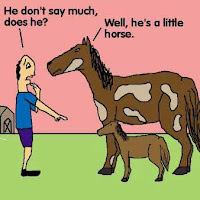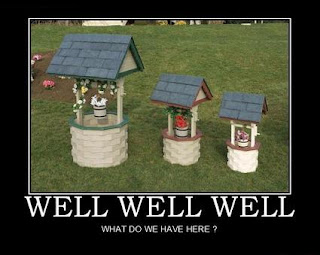2009 WSOP, Day 16: Does Humor Belong in Poker Tournament Reporting?
 I assume Julius Goat and perhaps a few others recognize who I’m paraphrasing in that post title.
I assume Julius Goat and perhaps a few others recognize who I’m paraphrasing in that post title. I had thought yesterday that I might deliver a thesis on the purpose and significance of puns and/or wordplay -- specifically with regard to their use in the context of poker tournament reporting -- but have decided against such. After all, nothing is less funny than to explain a joke.
Of course, while puns are certainly jokey and perhaps rightly regarded as a particularly facile form of humor, they aren’t strictly that. They serve a purpose beyond just causing a momentary chuckle -- or groan -- for the reader. Or can, anyway. And so maybe I will say just a word or two about ’em.
When I alluded to the subject of puns a couple of days ago, the Poker Grump pointed me to a recent New York Times piece on the subject which includes a lot of famous quotes about puns. There the author, Joseph Tartakovsky, starts off quoting John Dryden, the Restoration poet, playwright, and critic, saying that a pun is the “lowest and most groveling kind of wit.” Tartakovsky also alludes to the 18th-century essayist and dictionary-writer Dr. Samuel Johnson’s hatred of puns, although points out that Johnson -- a well-regarded conversationalist -- would himself indulge in puns in his interactions with others.
 Tartakovsky also mentions Shakespeare -- who, of course, puns all the time, even in his tragedies -- but doesn’t specifically talk about Johnson’s criticism of Shakespeare’s punning.
Tartakovsky also mentions Shakespeare -- who, of course, puns all the time, even in his tragedies -- but doesn’t specifically talk about Johnson’s criticism of Shakespeare’s punning. In his famous Preface to an edition of Shakespeare’s plays, Johnson talks about how puns (or “quibbles,” as the original Dr. J. calls ’em) are “to Shakespeare, what luminous vapours are to the traveller; he follows it at all adventures, it is sure to lead him out of his way, and sure to engulf him in the mire. It has some malignant power over his mind, and its fascinations are irresistible.”
For Johnson, the biggest issue is how the presence of a pun tends to distract the reader or audience, especially when it undercuts the necessary sobriety of a tragedy. At the very beginning of Hamlet, for example, the prince comes onto the stage and speaks with his uncle, Claudius, who (we will eventually learn) has murdered Hamlet’s father, the king of Denmark, and not only taken the throne but married Hamlet’s mother. Here Claudius calls Hamlet “son,” then asks him why he’s so gloomy: “How is it that the clouds still hang on you?” Hamlet responds by saying facetiously “Not so, my lord. I am too much i’ the sun.”
It’s a bit of wordplay that allows Hamlet to answer Claudius’ question by saying, in effect, stop calling me “son.” But Johnson regards such puns as evidence of some “malignant power” taking over Shakespeare’s mind, as if his love of wordplay is like some sort of mental disorder that causes him to forget his primary purpose. Johnson goes on (with some hyperbole) to say that for Shakespeare a pun was a “golden apple for which he will always turn aside from his career, or stoop from his elevation,” something which “gave him such delight, that he was content to purchase it, by the sacrifice of reason, propriety and truth.”
 Johnson is right to criticize the unseemly, gratuitous use of puns or wordplay that distracts the reader or audience from what is really important about a character or scene. However, in the case of Hamlet, his constant joking around -- as evidenced by his frequent puns and witty utterances -- is a big part of who he is, a young man who isn’t convinced that life isn’t an absurd jest. There are other places in Shakespeare where the “quibbles” are less integral, but there’s often a purpose to them, too, that makes it easier to defend Shakespeare’s use of them.
Johnson is right to criticize the unseemly, gratuitous use of puns or wordplay that distracts the reader or audience from what is really important about a character or scene. However, in the case of Hamlet, his constant joking around -- as evidenced by his frequent puns and witty utterances -- is a big part of who he is, a young man who isn’t convinced that life isn’t an absurd jest. There are other places in Shakespeare where the “quibbles” are less integral, but there’s often a purpose to them, too, that makes it easier to defend Shakespeare’s use of them.Which brings us back to poker and tourney reporting, in particular the use of puns in post titles when live blogging events. As far as I’m concerned, the occasional bit of wordplay or pun in a post title can be a plus as long as it doesn’t inordinately get in the way of the primary purpose of the blog -- namely, to report the action in a way that makes readers want to stay on the site and follow along.
There are a few ways to achieve that purpose of keeping the audience engaged -- to be accurate, to be clear, and to be interesting. If the blog failed too greatly in any of these ways, readers would (and should) stop reading.
So, when a player named Adam Fyshe wins a hand in which his flop bet causes another player to think so long the clock has to be called before he folds, a headline “Fyshe Makes Opponent Tank” should be acceptable because, well, it’s accurate, it’s clear, and it’s interesting.
But is it funny? Maybe for a moment. According to Tartakovsky, “Puns are the feeblest species of humor because they are ephemeral: whatever comic force they possess never outlasts the split second it takes to resolve the semantic confusion.” He’s probably right.
 Okay, even if it is funny (a little), the question remains: Does humor -- even of the most fleeting variety -- belong in poker tournament reporting? I mean, these guys are playing for hundreds of thousands of dollars after all -- it is serious business. And for 85-90% of the players who fail to cash, and even for those who do cash but come up short of the ultimate goal of winning the sucker, the tourneys do play out like “tragedies,” at least in the technical sense of failing to have happy endings.
Okay, even if it is funny (a little), the question remains: Does humor -- even of the most fleeting variety -- belong in poker tournament reporting? I mean, these guys are playing for hundreds of thousands of dollars after all -- it is serious business. And for 85-90% of the players who fail to cash, and even for those who do cash but come up short of the ultimate goal of winning the sucker, the tourneys do play out like “tragedies,” at least in the technical sense of failing to have happy endings. That said, it is still a game -- a form of play. And so keeping it light (within reason) is probably the right instinct, generally speaking.
The headline last night on ESPN for the story reporting the Lakers’ victory over the Magic was “Fisher King,” alluding simultaneously to those big shots Laker guard Derek Fisher hit at the end of the game as well as to that figure who turns up in stories of King Arthur whose purpose is to take care of the Holy Grail. At first, the allusion might seem meaningless, but think about how the sports championships are often referred to as the “Holy Grail” and you see there’s something appropriate to the pun’s use. (It’s also accurate, clear, and interesting.)
There’s no denying puns make us groan, though. And I agree that they shouldn’t be overdone to the point that they get in the way of communicating accurately and clearly and keeping the reader engaged. In other words, it’s okay to cause a bit of eye-rolling, but you don’t want the eyes to roll away from your words altogether.
So roll on over to PokerNews’ live reporting page to follow the coverage as the WSOP continues. Five different events on the sked today, including the one I’ll be covering -- Event No. 26, the $1,500 Limit Hold’em. See you there.
Labels: *high society, 2009 WSOP, Samuel Johnson, William Shakespeare













